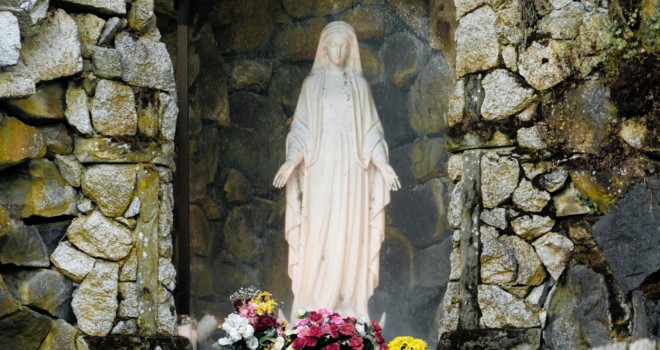I’ve always been a sucker for quotes. I keep a document on my computer, a folder in my Evernote, and have barely weaned myself of the scraps of paper that used to hold meaningful quotes in my purse, on my refrigerator, and in my office.
Maybe it’s because I’m an avid reader and always have been. Maybe it’s because of the power of words to move me, change me, affect me. Maybe it’s just a manifestation of my inner pack-rat.
Whatever the reason, when I read this quote from the Catechism (1847), “To receive [God’s] mercy, we must admit our faults,” I felt the need to jot it down and carry it with me.
Much of what I understand about my Catholic faith is through the lens of Mary. She seems to be, for me, the role model, the hero, the guide, that I feel like I’ve been seeking my whole life.
My first contact with her was sitting in a crowded Mother’s Day Mass with my then-boyfriend’s family. I was still trying to figure out what it was about the Mass that had me hooked, and I was at the stage of calling Mass “the human need for ritual.” Maybe there was a God, and maybe there wasn’t, but there was no denying the power of that place, the beauty of that ceremony, the pull of it all.
That Mother’s Day, during Father’s homily about Mary as the unconditional mother to each of us, I felt something shift. Though I had often cried in the Masses I attended—much to my embarrassment—this was different.
I was sobbing. I was snotting. I was out of control.
I had to leave the sanctuary of our tiny church. All 50 people must have seen me go (more embarrassment). I perched on the choir steps in the vestibule and tried every technique I knew to stop crying, to no avail.
What was wrong with me?
Looking back, I think Mary touched me. But why would she bother with me?
The answer’s easy: because she loves me, just as she loves all of us.
If mercy requires me to admit my faults, then perhaps what Mary did at Mass was nudge me in that direction. It was a matter of looking deeper than those faults I wore like badges of honor. I had to bare myself, even to the harsh criticism that I had of myself.
Before I could stand before God, I had to accept who I was and who I had been. Before I could open my heart to the mercy that was perched in His hands, just waiting for my “Yes,” I had to first let go…of my conviction and my fear and my pride. I had to accept help before He could give it.
Just like the recovering addict, I had to admit that there was a problem, that I had faults that needed Him.
That’s where Mary came in. My Mother of Mercy gently held me, wiped my brow, whispered comfort. As I struggled and thrashed and sobbed, she was there. I can look back and see her, praying for me in the words she used long ago, “Let it be according to your word” (cf. Luke 1:38).
I’m a fan of fireworks, and in my faith life, I’m often looking for them. I want fanfare and dramatic signs. But instead of pyrotechnics, I usually get small candles. They might be fragrant, but they’re just not as impressive as what I have in mind.
Jesus’ message through Divine Mercy is a message of trust and love, and I need that. The message shocks me in its simplicity: “Jesus, I trust in You.”
In our small parish church, we have a life-size Divine Mercy image, and across the sanctuary, there’s a life-size image of Our Lady of Guadalupe.
She looks down at me from the wall. Is she trying to tell me something?
Mary, Mother of Mercy, points me to God the Father of the Divine Mercy. Jesus is Divine Mercy, and His mother points me to it.
But what does that mean?
It means that I have to really trust, to let Him help me get past my results mentality, beyond my desire for efficiency, over my outcome orientation. I can say “No” just as easily as I can say “Yes.”
Mary stands before me, Mother of Mercy, and shows me the better priorities that are God’s. God’s grace — whether it’s the grace to trust Him or just to hold His mother’s hand — is an occasion of grace, an opportunity to grow.
Mercy awaits me, waiting for my “Yes,” and Mary stands beside me, holding my hand.
Photo by Dan Meyers on Unsplash












